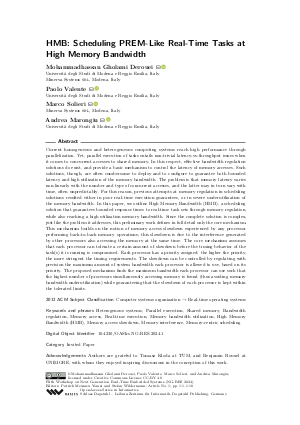@InProceedings{gholamiderouei_et_al:OASIcs.NG-RES.2024.1,
author = {Gholami Derouei, Mohammadhassan and Valente, Paolo and Solieri, Marco and Marongiu, Andrea},
title = {{HMB: Scheduling PREM-Like Real-Time Tasks at High Memory Bandwidth}},
booktitle = {Fifth Workshop on Next Generation Real-Time Embedded Systems (NG-RES 2024)},
pages = {1:1--1:18},
series = {Open Access Series in Informatics (OASIcs)},
ISBN = {978-3-95977-313-3},
ISSN = {2190-6807},
year = {2024},
volume = {117},
editor = {Yomsi, Patrick Meumeu and Wildermann, Stefan},
publisher = {Schloss Dagstuhl -- Leibniz-Zentrum f{\"u}r Informatik},
address = {Dagstuhl, Germany},
URL = {https://drops.dagstuhl.de/entities/document/10.4230/OASIcs.NG-RES.2024.1},
URN = {urn:nbn:de:0030-drops-197049},
doi = {10.4230/OASIcs.NG-RES.2024.1},
annote = {Keywords: Heterogenous systems, Parallel execution, Shared memory, Bandwidth regulation, Memory access, Real-time execution, Memory bandwidth utilization, High Memory Bandwidth (HMB), Memory access slowdown, Memory interference, Memory-centric scheduling}
}

 Creative Commons Attribution 4.0 International license
Creative Commons Attribution 4.0 International license





